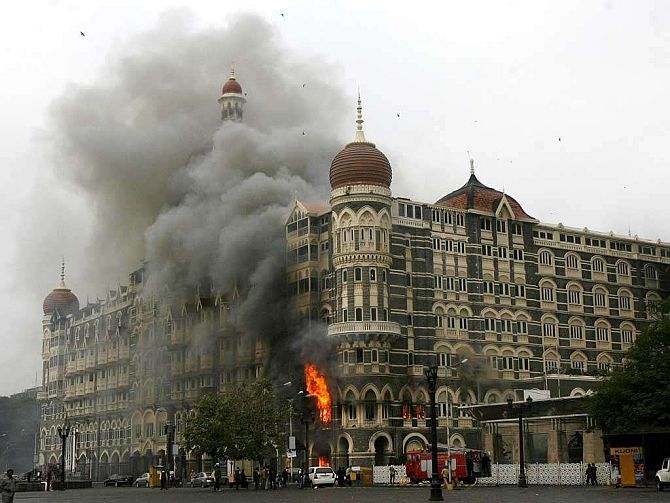 We continue to be what we were before 26/11-- sitting ducks, says Mahesh Vijapurkar.
We continue to be what we were before 26/11-- sitting ducks, says Mahesh Vijapurkar.
How wonderful it would have been had the fifth anniversary of the 26/11 terrorist attack on Mumbai -- the CST, The Taj, the Trident, the Jewish guesthouse, and Leopard -- if we had been able to enjoy the comfort of knowing that there can no more be such events again?
But that, it is patent, is wishful, even absurd. Whatever the television and newspapers threw at us was scary. They told us that every planned and announced step in strengthening the deterrent against such violently disruptive intrusions has been, at best, only been under-executed. That the city stands as vulnerable as it did five years ago have been rubbed in.
The worst has been the disclosures in The Siege, co-authored by Adrian Levy and Cathy Scott-Clark, which is: after the worst ever attack, the ‘disaster’ has not been ‘analysed’ to draw lessons. Levy said also a detailed interview to rediff.com, that the terrorists used most of the protocol used by Indian security agencies in their operations.
That analysis is quite pertinent if the country has to learn to deal with terror in the future. It could include issues like the chain of command because the anti-terror squads in various states are in themselves not fully equipped, both in terms of the wherewithal as well as attitudes, to combat terror. Probing terror is just one of the things.
Terrorism is what is delivered suddenly -- and that is its intent -- for maximum damage, both physical, psychological and in terms of lives taken and for that preparedness is vital. After the 9/11 attacks on the United States, that country has tightened every screw it conceivably can to prevent a recurrence. It has carried its fight outside the US territory.
Analysts have it that in terms of managing terror, or intent to manage terror attacks, we have not managed a fool proof and deliverable protocol. It is as if it suffices that the country’s leadership can just mouth, after each terror event, the country’s ‘resolve’ to defeat it and assertion of ‘zero tolerance’. As if words are sufficient anodyne enough.
Ramesh Mahale, the investigating officer in the 26/11 case, since retired, has revealed how poorly placed we are even in the forensic aspects of dealing with the fallout of a terror attack. Mohmded Ajmal Amir, dubbed Ajmal Kasab, needed to have his age determined soon after being taken to the hospital.
“Usually ward boys prepare the documents in such tests”, he told the Indian Express. “I asked for a doctor.” He had to ask. “I thought the trial would be difficult and how much evidence could the ward boys give?” He says, and rightly so, that the country owed a debt to Tukaram Omble who died grappling with Kasab.
Because of that, “we got the chance to blame Pakistan for the first time”. Had Kasab not been nabbed? Had he been one of the bodies that had to be taken to an undisclosed place for burial because Pakistan would not accept them? Without nabbing one of the ten, there would never have been a trial. We would only have had ‘zero tolerance statements’.
The mindset of those who should be dealing with terror seems that if it were to happen again, it would happen almost at the same place using much the same modus operandi. That, to put it simply, is a flatfoot’s mindset. The sophistication keeps changing, keeping the terrorists miles ahead of the law-enforcers.
Preparedness is not to be measured in policies and even budget allocations -- which in this case, is certainly going to be huge -- but by how plans are prepared and executed to stymie attacks. Mumbai has been a frequent target, including buses, trains and markets since 1993 and yet, the nervousness after five years since 26/11 is palpable.
26/11 was not the same as March 12 serial bombing. The choice is with the terrorists. If at all they strike at the same place twice, it would be only to underscore how ill-prepared we generally are. That is a lesson we needn’t have to learn because every gap, however narrow, has to be covered. Or else, the city, this or any other, would be an easy, soft target.
After that serial blasts, for which the RDX came via the Raigad coast, things were tightened around that region but even today, unregistered fishing boats clutter the spot. Because the 26/11 team arrived by sea, coastal politicking was introduced; the boats are insufficient, fuel inadequate and personnel assigned to them may need to learn to swim in the sea.
Simple things have not been done. Contracts are being issued or are being contemplated for setting up closed-circuit television cameras in Mumbai and elsewhere. And where set up, almost invariably, they do not function. They are a major means to unravel the attacks and nab the crooks. Even the metal detectors don’t work.
We continue to be what we were before 26/11-- sitting ducks.
Image: The Taj Hotel during the attacks. Image: Arko Dutta/Reuters










